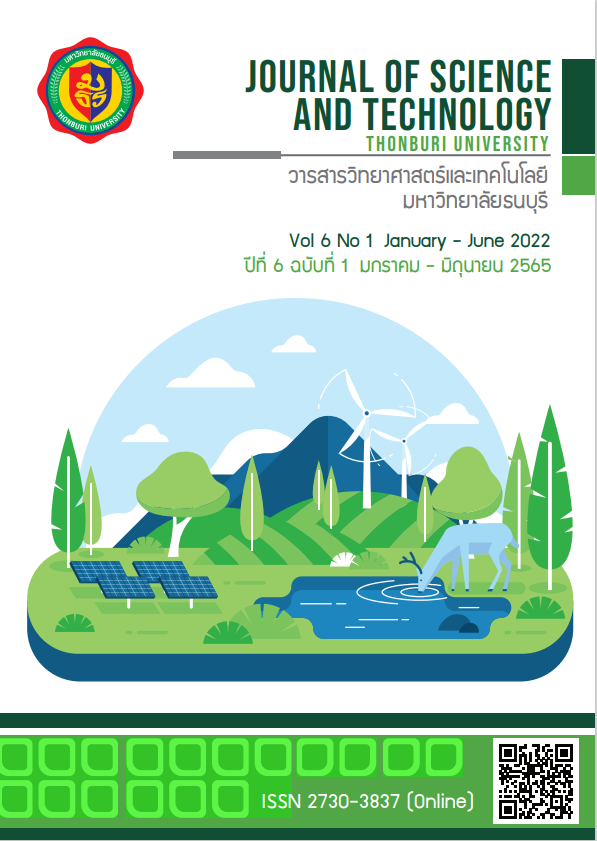การสังเคราะห์เส้นใยนาโนซิลิกาด้วยเทคนิคการให้ความร้อนด้วยกระแสไฟฟ้า
คำสำคัญ:
เส้นใยนาโนซิลิกา, เทคนิคการให้ความร้อนด้วยกระแสไฟฟ้า, โครงสร้างจุลภาค, กล้องจุลทรรศน์อิเล็กตรอนแบบส่องกราดบทคัดย่อ
งานวิจัยนี้มีจุดมุ่งหมายเพื่อหาเงื่อนไขที่เหมาะสมในการสังเคราะห์เส้นใยนาโนซิลิกาจากแท่งแกรไฟต์ผสมกับซิลิคอนไดออกไซด์ที่อัตราส่วนผสม โดยน้ำหนักของซิลิคอนไดออกไซด์เป็น 10 20 30 และ 40 เปอร์เซ็นต์ โดยใช้เทคนิคการให้ความ ร้อนด้วยกระแสไฟฟ้าภายใต้บรรยากาศของก๊าซอาร์กอน ทำการศึกษาองค์ประกอบทางเคมีและโครงสร้างจุลภาคของเส้นใย นาโนซิลิกาที่เตรียมได้โดยใช้เทคนิคการเลี้ยวเบนของรังสีเอ็กซ์ (X-ray diffractometry, XRD) กล้องจุลทรรศน์อิเล็กตรอน แบบส่องกราด (Scanning Electron Microscope, SEM) และกล้องจุลทรรศน์อิเล็กตรอนแบบส่องผ่าน (Transmission Electron Microscope, TEM) พบว่าเส้นใยนาโนที่ได้มีลักษณะเรียบยาว ขนาดเส้นผ่านศูนย์กลางเฉลี่ยประมาณ 50 - 90 นาโนเมตร ความยาวมากกว่า 20 ไมโครเมตร ที่เงื่อนไข 20 wt% ของซิลิคอนไดออกไซด์ เป็นเงื่อนไขที่เหมาะสมที่สุดในการ สังเคราะห์เนื่องจากปริมาณเส้นใยนาโนที่สังเคราะห์ได้มากที่สุดคือ 10 เปอร์เซ็นต์
เอกสารอ้างอิง
Loccufier, E., Geltmeyer, J., Esquivel, D., D’hooge, D. R., De Buysser, K., & De Clerck, K. (2019). Electrospinning of silica nanofibers without carrier polymer for advanced engineering applications. 19th World Textile Conference on Textiles at the Crossroads, 11-15 June 2019, Ghent, Belgium.
Yehia, M. M., Ihsanullah, Ayman, S., Tareq A., & Muataz, A. A. (2018). A Review of Carbon Nanomaterials’ Synthesis via the Chemical Vapor Deposition (CVD) Method. Journal of Materials, 11, 822-858.
Samor, B. & Singjai, P. (2017). Solar heat absorbing coating from multi-walled carbon nanotube composites with linear low-density polyethylene-coated copper sheet. Journal of Reinforced Plastics and Composites, 36(9), 714–721.
Mehran, S., Saeed, B. & Morteza, D. J. (2018). Fabrication and investigation of silica nanofibers via electrospinning. Journal of Materials Science & Engineering C, 91, 502-511.
Daniel, F. H. R., Posidia, P. G. & Andres, R. R. (2019). Production and characterization of silica nanoparticles from rice husk. Advanced Materials Letters, 10(1), 67–73.
Jianming, Y., Chao, W., Shiheng, L., Nian, L., Jia, Z. & Zhenda, L. (2019). Li+-Containing, Continuous Silica Nanofibers for High Li+ Conductivity in Composite Polymer Electrolyte. Small Journal, 15, 1–9.
Beyza, N., Mehed, D. C., Yusuf, P., Yasin, A. & Ali, K. (2019). Centrifugally spun silica (SiO2) nanofibers for high temperature air filtration. Aerosol Science and Technology, 53(8), 921–932.
Maha, B. & Sylvie, L. (2020) . Laser-induced breakdown measurements of silica nanofibers in air and immersed in water, ethanol and isopropanol. EPJ Web of Conferences, 238, 1–2.
Niloufa, S. & Ali, A. G. (2017). How Porous Nanofibers Have Enhanced the Engineering of Advanced Materials: A Review. Journal of Textiles and Polymers, 5(2), 57-72.
Muhamad, N., Heru, S., & Widiya, S. (2020) . Synthesis of PVA/SiO2 Nanofibers by Electrospinning Method for Supercapacitor Separators. 6th International Seminar on Science and Technology, July 25th 2020, Surabaya, Indonesia.
Singjai, P., Wongjamras, A., Yu, L. D. & Tunkasiri, T. (2002). Production and characterization of beaded nanofibers from current heating of charcoal. Journal of Chemistry Physics Letters, 366, 51-55.
Chuang, Hwang, W. & Liu, S. (2010). Effects of Graphite, SiO2, and Fe2O3 on the Crushing Strength of Direct Reduced Iron from the Carbothermic Reduction of Residual Materials. Materials Transactions, 51(3), 488-495.
Magda, A., Hesham, F. A., Hesham, M. S., Aref M. E., & Ahmed, I. (2013) . Preparation and Characterization of Silica Nanoparticles by Wet Mechanical Attrition of White and Yellow Sand. Journal Nanomedicine and Nanotechnology, 4(6), 183-196.
Mansour, B., Behzad, N. & Ali, M. (2018). A study on crystallization of amorphous nano silica particles by mechanical activation at the presence of pure aluminum. Journal of Solid State Chemistry, 263, 208-215.
ดาวน์โหลด
เผยแพร่แล้ว
รูปแบบการอ้างอิง
ฉบับ
ประเภทบทความ
สัญญาอนุญาต

อนุญาตภายใต้เงื่อนไข Creative Commons Attribution-NonCommercial-NoDerivatives 4.0 International License.




